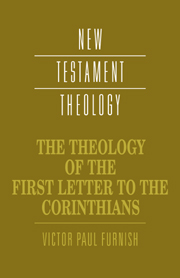Book contents
- Frontmatter
- Contents
- Editor's preface
- Preface
- List of abbreviations
- 1 Introduction
- 2 Knowing God, belonging to Christ
- 3 Belonging to Christ in an unbelieving society
- 4 Belonging to Christ in a believing community
- 5 Hoping in God, the “all in all”
- 6 The significance of 1 Corinthians for Christian thought
- Select bibliography
- Index of references
- Index of names
- Index of subjects
4 - Belonging to Christ in a believing community
Published online by Cambridge University Press: 05 June 2012
- Frontmatter
- Contents
- Editor's preface
- Preface
- List of abbreviations
- 1 Introduction
- 2 Knowing God, belonging to Christ
- 3 Belonging to Christ in an unbelieving society
- 4 Belonging to Christ in a believing community
- 5 Hoping in God, the “all in all”
- 6 The significance of 1 Corinthians for Christian thought
- Select bibliography
- Index of references
- Index of names
- Index of subjects
Summary
As we have seen, all of the issues Paul takes up in 1 Corinthians 5.1–11.1 arise from the fact that those who belong to Christ necessarily continue to be involved in various ways with an unbelieving society. Although the difficulties and responsibilities of being an end-time community with present-time involvements are still in view in 11.2–14.40, the focus in this part of the letter is more on life within the believing community itself. Here the apostle addresses three matters that concern him about the congregation's conduct when all of its members, each of whom would have been associated with some particular household conventicle, “assemble as a church” (11.18) at one place (cf. 11.20; 14.23): the hair of women who pray or prophesy should be properly arranged (11.3–16), the “Lord's supper” should be observed in a manner that is appropriate to its significance (11.17–34), and spiritual gifts should be exercised in ways that benefit others (14.1–40).
As in the preceding sections of the letter, the apostle supports his directives primarily by emphasizing that, in their belonging to Christ and to God, believers participate in a new order of existence which both graces and claims their lives even while the present age continues. This is most evident in 12.12–13.13, the letter's second sustained section of theological exposition (cf. 1.18–2.16). Here Paul lays the theological groundwork for his instructions about spiritual gifts by portraying life in Christ as membership in “one body,” and by stressing the critical importance of agapē.
- Type
- Chapter
- Information
- The Theology of the First Letter to the Corinthians , pp. 76 - 104Publisher: Cambridge University PressPrint publication year: 1999

